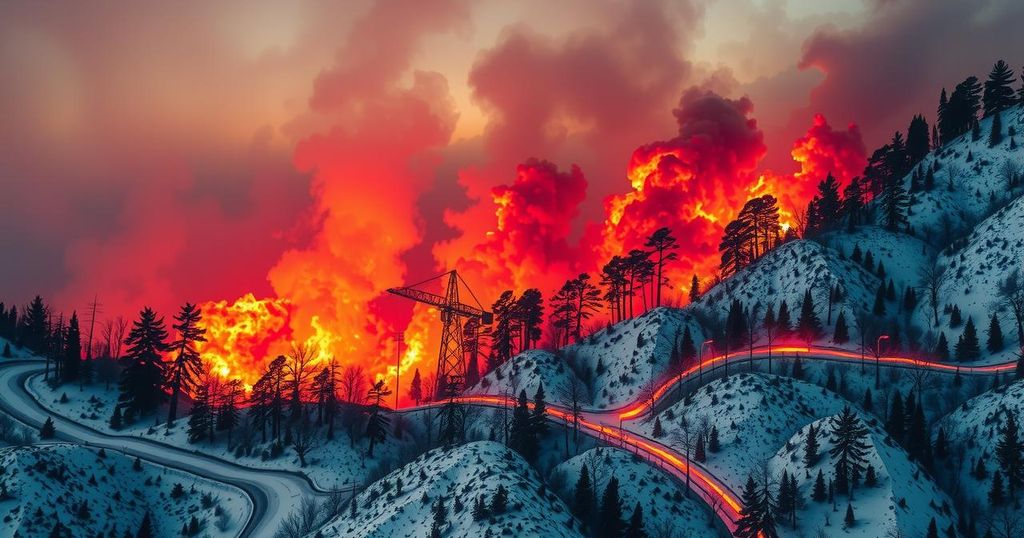Rising Fire Risks in the Middle East Prompt Urgent Technological Responses at Intersec 2025

Climate change is raising fire risks in the Middle East, prompting experts to convene at Intersec 2025 to discuss innovative solutions for firefighting. The conference will address the impacts of rising temperatures, water scarcity, and extreme weather on fire operations. Proactive measures, including substantial investments in water management, are being undertaken by regional authorities to bolster resilience against climate-induced fire hazards.
Climate change is intensifying fire risks in the Middle East, necessitating innovative technological solutions for effective firefighting measures. This pressing issue will be a focal point at the Fire & Rescue Conference, held during Intersec 2025 from January 14 to 16 at the Dubai World Trade Centre. The rise in extreme temperatures, drought conditions, and urban challenges compels specialists to explore strategies for enhancing fire protection amid forecasted increases in extreme heat events.
The region is projected to encounter a significant uptick in extreme heat days, with forecasts indicating 133 to 144 such days annually by 2050 in the UAE and 108 to 124 days in Saudi Arabia. These conditions, coupled with prolonged droughts, exacerbate the risks of wildfires, thereby straining firefighting resources. Leading experts will convene to discuss the consequences of climate change on fire behavior and the necessary interventions to manage these hazards successfully.
Dana Nassif, Senior Consultant at WSP Middle East, highlighted that the increasing temperatures and droughts are creating conditions conducive to wildfires. She noted, “Rising temperatures and droughts are increasing fire risks across the Middle East. Water scarcity poses a significant challenge for firefighting systems, particularly as urban areas expand.” The urgent need for sustainable water management and advanced fire suppression technologies, particularly those utilizing artificial intelligence, is underscored in this growing crisis.
Further corroborating the seriousness of these challenges, a study by Think Hazard projected that the UAE and Saudi Arabia will experience droughts every five years on average, intensifying water scarcity concerns. Paul Jennings, Assistant Fire Commissioner at Red Sea Global, emphasized preparedness in addressing these challenges, asserting that ensuring guest safety is of utmost priority.
In response to the anticipated challenges presented by climate change, Saudi Arabia is investing $6 billion in 200 water projects while the UAE is implementing its Water Security Strategy 2036. Intersec 2025 serves as a vital platform for showcasing advancements related to fire safety technologies, including AI-driven fire prediction systems.
The Fire & Rescue sector at Intersec 2025 is expected to attract over 1,200 exhibitors from across 60 nations, showcasing the latest in fire safety innovations. Esteemed organizations such as NAFFCO and Waterfall Pumps will present state-of-the-art solutions tailored to meet the evolving needs of the region’s firefighting services. Grant Tuchten, Portfolio Director at Messe Frankfurt Middle East, stated that the event will foster collaboration to counter the increasingly prevalent fire risks in the Middle East.
Set for January 14-16, 2025, this conference will play a critical role in addressing how the industry can adapt to climate-induced fire challenges and innovate towards a more resilient future.
The Middle East is experiencing significant climactic changes that are leading to an increase in fire hazards. Rising temperatures and water scarcity, paralleled by urban expansion, are posing greater challenges for firefighting services in the region. Specifically, the predicted increase in extreme heat days and frequency of droughts are compelling experts and authorities to seek urgent, innovative solutions to safeguard communities. Upcoming conferences such as Intersec 2025 are vital platforms for discussing technological advancements and strategic responses to these pressing issues.
In summary, climate change is amplifying fire risks in the Middle East, and it becomes increasingly essential to develop innovative strategies to mitigate these challenges. The Fire & Rescue Conference during Intersec 2025 will present a forum for stakeholders to share insights, technologies, and best practices aimed at enhancing safety and resilience in the face of climate-related adversities. With proactive initiatives underway, both Saudi Arabia and the UAE are positioning themselves to combat the adverse effects of climate change and ensure public safety effectively.
Original Source: premierconstructionnews.com







